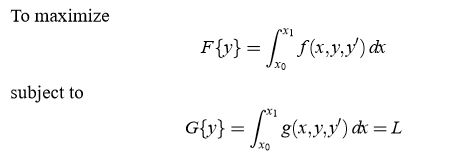I'm trying to minimize some integral (functional) subject to another integral constraint, like this: 
The theory to solve it employs Lagrange method as: 
Then the Euler-Lagrange method: it tells me that each partial derivative of the function h with respect to the variables x, y, z .. are equal to zero (in my case since the other side of the equality of the Euler Lagrange equations is zero, since there are no derivatives of any kind in function h). So, an algebraic system of equations results from this method, but when I try to solve it with NSolve, or Solve, it doesn't finish (I waited for 24 hours).
Here is the notebook with the derivative of h respect to "c". Where "L" is lambda (Lagrange multiplier), the main parameter (in the pics it would be "x") is "r", and c, l, d, a, b are functions of r, the rest of the letters are parameters. However, l(r) and d(r) are some functions that I "know", so I just want to find out c(r), a(r) and b(r).
D[((w*r*(1 - b))^2 + (v*(1 + a))^2)*c*
r*((l*w*r*b/(Sqrt[(w*r*b)^2 + (v*a)^2])) + (d*a*
v/(Sqrt[(w*r*b)^2 + (v*a)^2]))) +
L*(((w*r*(1 - b))^2 + (v*(1 + a))^2)*
c*((l*a*v/(Sqrt[(w*r*b)^2 + (v*a)^2])) - (d*w*r*
b/(Sqrt[(w*r*b)^2 + (v*a)^2])))), c]
 Attachments:
Attachments: